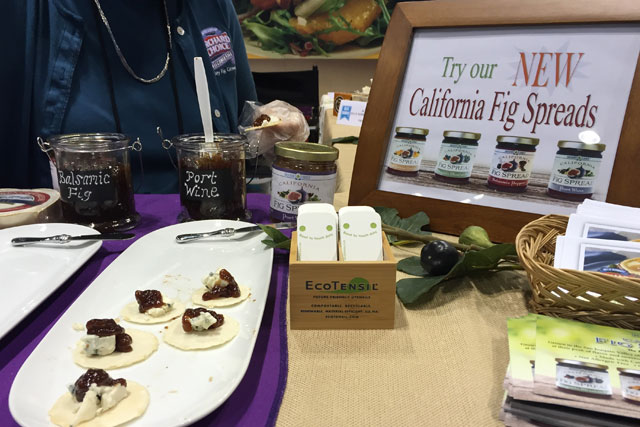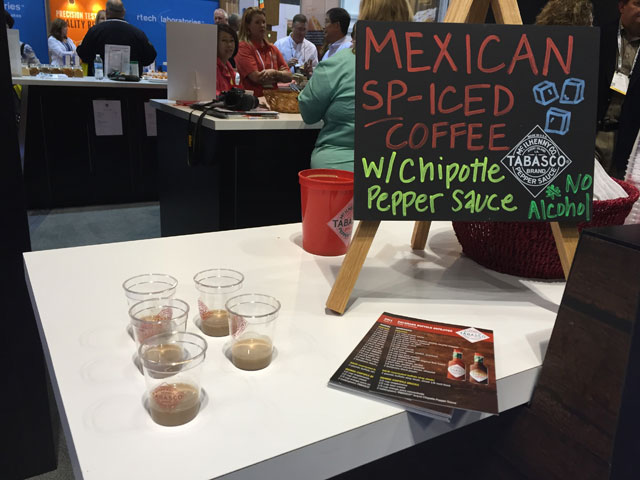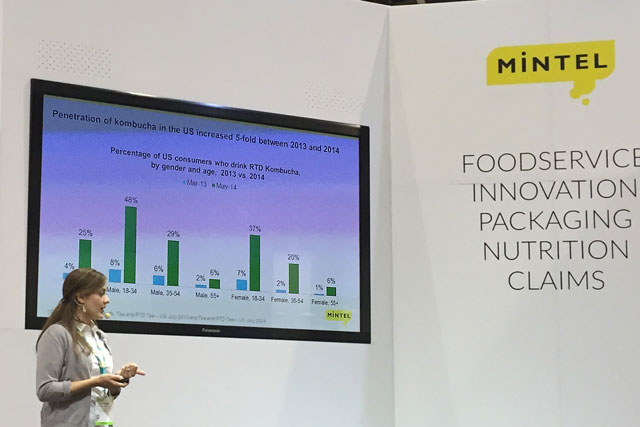Exploring Food Science Trends At The Institute of Food Technologists Expo
By Melissa McEwen in Food on Jul 26, 2015 6:00PM

I'm always happy to sample figs
While many people know about the National Restaurant Association show that happens annually in Chicago, fewer know about the Institute Of Food Technologists (IFT) Food Expo, a global gathering for food science professionals and companies, held earlier this month.
"Is it a conference for GMOs?" someone asked me when I told them I was going. Actually, no. Genetic modification is generally the domain of plant scientists, not food scientists. And it seems organic is a bit more lucrative in food these days judging by the number of vendors touting organic products. IFT is the kind of place you go if you make things like protein powders or meal replacement bars to shop for new ingredients to add to them. And the growing market for organics means manufacturers are scrambling to find compatible ingredients.

Wondergrain is sorghum
Same goes for gluten-free. I stopped by the Sorghum booth, a versatile grain riding the waves of the gluten-free trend. They showed off products both old-timey—like sorghum syrup, which Southerners have enjoyed on their breakfast foods for a long time—and new-fangled preparations like popped sorghum and sorghum kale salad.

Tabasco showing off some unusual uses for their products
IFT is also where you go if you want to make new flavors, textures or sweeteners for your products. I grabbed a milkshake flavored with natural tastes of "Praline Pecan Type," "Bourbon Type" and "Old Type Barrel Aged Natural Flavor Maplewood Type." Natural flavors are a hot market, even as people debate how "natural" they really are. The code of Federal Regulations says natural "means the essential oil, oleoresin, essence or extractive, protein hydrolysate, distillate, or any product of roasting, heating or enzymolysis, which contains the flavoring constituents derived from a spice, fruit or fruit juice, vegetable or vegetable juice, edible yeast, herb, bark, bud, root, leaf or similar plant material, meat, seafood, poultry, eggs, dairy products, or fermentation products thereof, whose significant function in food is flavoring rather than nutritional. "
"Natural" was also dominating the sweeteners, with an overwhelming amount of booths devoted to stevia, a no-calorie sweetener derived originally from the sweetleaf plant. The main selling point of stevia seems to be its plant origin, since almost everything I've ever tried with stevia tastes terrible at best. But the stevia used in food products is not just a leaf. It's industrially extracted and purified.
It's enough to give you an existential crisis about the entire concept of natural which makes you liable to conclude, as I have, that nearly everything we eat, including that snack you bought at Whole Foods, is processed food. Despite the seeming gulf between neon-colored gummy candies and organic low-sugar granola bars, we'd have neither without the efforts of food scientists.
Another big market was egg replacements, which have become popular as the market for vegan products grows, but also because egg prices have been volatile recently with the recent bird flu crisis. In Iowa alone 31,723,300 chickens had to be culled or destroyed.

Looking further towards the future of replacing animal products, scientist Mark Post discussed the hot topic of lab-grown meat. He said scientists have gotten to the point where they have created a burger, which they taste-tested on TV in the U.K. Right now it remains expensive, but Post presented plans for scaling the process up, which would decrease the price. They are also in the process of tackling a harder piece of meat to grow in the lab—steak.

Another fascinating stop was the Mintel booth, where I listened to a talk about the growing consumer avoidance of sugary products, which they attempted to tie to the growth in demand for sour products. We also got to taste a range of sours. I wasn't entirely convinced sugar avoidance had much to do with their popularity, since many have just as much sugar as conventional sweet products, if not more.
Later I attended a cocktail reception hosted by The Choline Information Council. If you haven't heard of choline you're not alone. And no it doesn't have anything to do with chlorine. But the Choline Information Council aims to change that in a big way by asking the government to create a Recommended Dietary Allowance for this nutrient, which is found primarily in animal products like eggs. They are armed with research that seems to show it is important for pregnant women and the elderly, as well as large-scale deficiencies—one number I saw quoted at the show was that 90% of adults do not consume adequate amounts. They also were selling it to various supplement and food manufacturers; right now it's in some forms of Vitamin Water.
One major difference from the NRA show is that IFT serves no alcohol. And there is no guarantee the food will be delicious, since not all food technology is focused on taste. There were a couple of samples that made me want to wash my mouth out with Malort, but overall the show was a fascinating look at the world of food science.